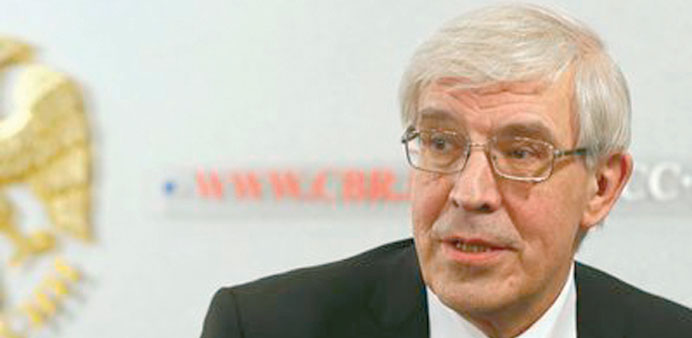Russia’s central bank is likely to keep its main policy rates on hold when it meets next week but sees some room to ease the cost of term lending to banks, its outgoing chairman said yesterday.
Capital outflows that have contributed to a weakening of the rouble remain “very heavy”, chairman Sergei Ignatyev said, complicating the central bank’s task of bringing down high inflation even as the $2tn Russian economy slows.
Ignatyev, who retires later this month after 11 years at the helm of the Bank of Russia, described the decision that policy makers will have to take at their June 10 meeting as “very difficult”.
The central bank has opted in recent months to hold its key short-term policy rates while easing the cost of some loans with longer maturities, in what economists interpret as a signal of its bias towards easing monetary policy.
But a further rise in inflation to 7.4% in May, above the central bank’s 5-6% target range, will rule out a cut in key rates at Ignatyev’s last meeting as chairman.
“It’s possible that we will leave all key interest rates unchanged,” he said in a speech to a banking conference. The central bank sees room for cutting medium-term rates by another 25 basis points, he later told journalists.
Ignatyev said price growth was expected to slow after mid-year. Last year’s poor harvest had pushed up consumer prices and the comparison is likely to flatter year-on-year inflation performance going into the autumn.
That, say economists, should pave the way for Ignatyev’s more liberal successor, Elvira Nabiullina, to push for lower rates to help lift economic growth that slowed to just 1.6% in the first quarter.
Economists doubt that monetary easing will be effective because of the wide interest margins earned by Russia’s oligopoly of state-controlled banks. Nabiullina has pledged steps to enhance the market impact of monetary policy.
As Russians rely heavily on imported goods and products, the weakening of the rouble exerts upward pressure on prices. Capital outflows from the world’s No.2 oil exporter are seen as the main driving force behind the depreciation of the currency.
“Unfortunately, capital outflows remain very heavy and we don’t see any downward trend for now,” Ignatyev told journalists.
Ignatyev complained earlier this year that some 2.5% of the national income, or $49bn, was illegally spirited out of Russia abroad in 2012. Critics of President Vladimir Putin say that much of the capital flight is driven by corrupt officials.
“The size of capital flight we observe is unnatural for the Russian economy, it should not be like this and that is why I hope it will sooner or later decline or stop,” Ignatyev said.
The rouble fell to its weakest level in almost a year on Wednesday, as investors see-saw on the chances of the Federal Reserve rolling back the supply of cheap cash that has boosted emerging market currencies.

